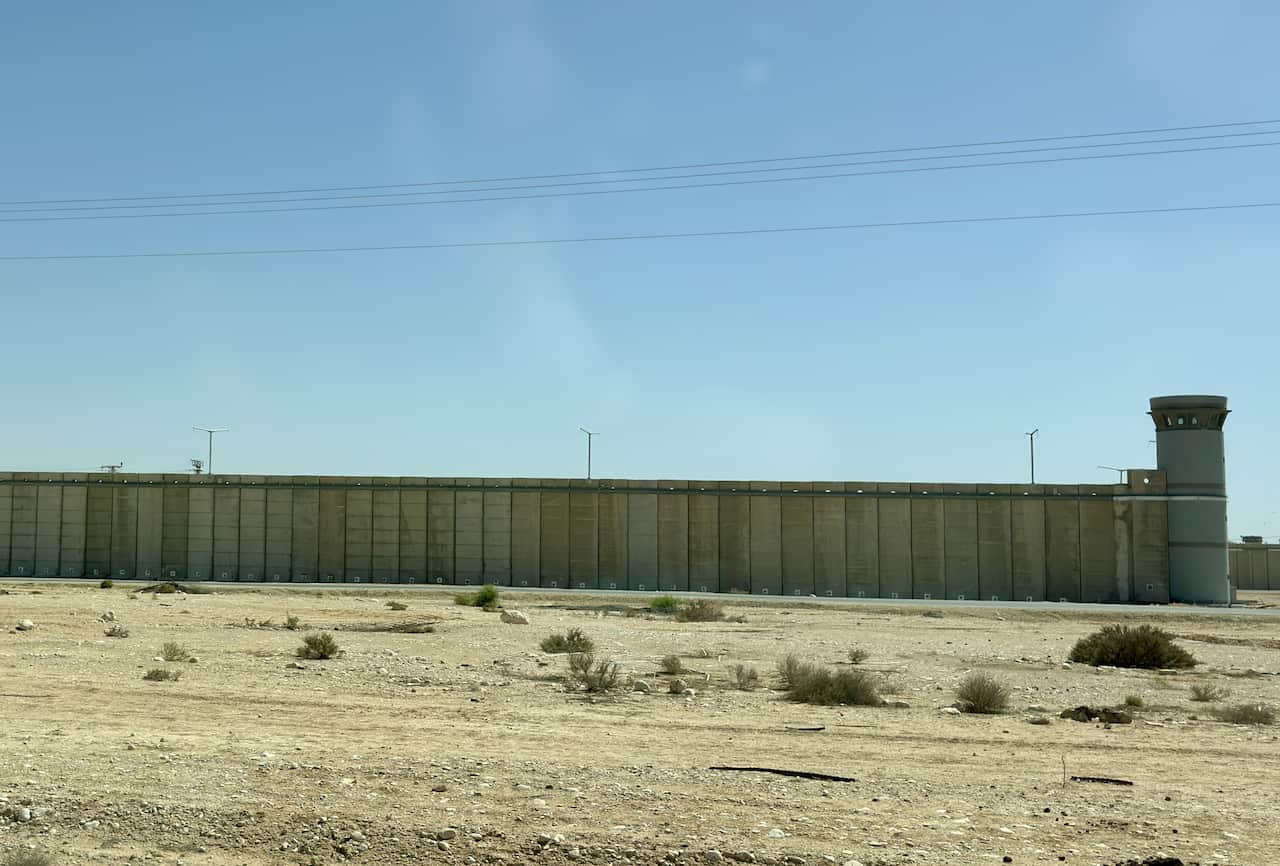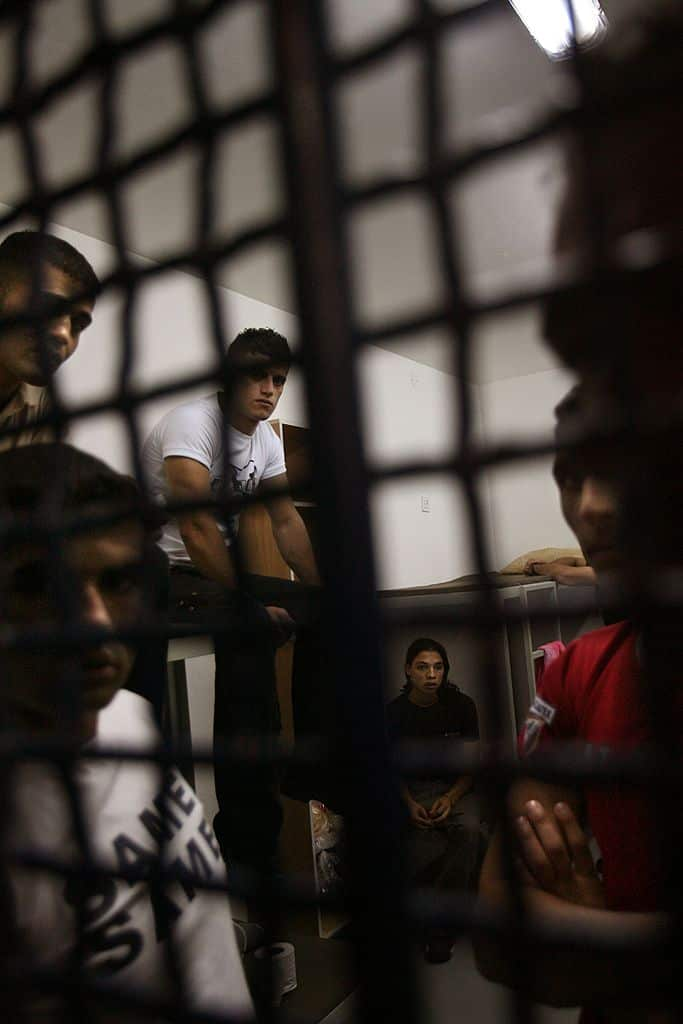The story contains details some readers might find distressing.
Surya McEwen, one of seven Australians detained in Israel following arrest on a Gaza-bound aid flotilla, has alleged violence and abuse at the hands of Israeli soldiers.
The allegations, released in a statement seen by SBS News, involve physical abuse resulting in his dislocated arm, sleep deprivation and intimidation.
It follows reports that Swedish campaigner Greta Thunberg was shoved and forced to wear an Israeli flag while held in prison, according to Global Sumud Flotilla activists who have since been deported from the country.
In the statement released on Monday afternoon on behalf of McEwen, he claims he was placed in a large cage with 80 others, where Israeli national security minister Itamar Ben-Gvir yelled abuse at them.
Ben-Gvir — one of two Israeli ministers the Australian government placed sanctions on in June for inciting violence against Palestinians in the West Bank — was filmed calling some detainees "terrorists". The minister's office has been contacted for comment.
Israel arrested 137 activists after intercepting the flotilla carrying aid to Gaza, with a spokesperson for the Department of Foreign Affairs and Trade (DFAT) confirming to SBS News that they are providing assistance to seven Australians detained in Israel.
While DFAT did not provide names, citing privacy reasons, the Global Sumud Flotilla organisers identified them as Abubakir Rafiq, Hamish Paterson, Juliet Lamont, Bianca Webb-Pullman, and Cameron John Tribe, in addition to McEwen. They said another Australian's identity is not publicly known.
Israel's foreign ministry has dismissed claims of mistreatment of flotilla activists at Ketziot prison as "brazen lies" in a post on X.
Ketziot prison — where the Australians are currently being held — has long faced criticism from human rights groups over its conditions.
The Australians in Ketziot prison
McEwen claimed his head was slapped to the ground and his arm was dislocated after being detained by Israeli authorities.
The Australian, who said he was in an "alright" physical condition, claimed to be sharing a cell in Ketziot prison with 12 other detainees, where he said he had been subject to sleep deprivation techniques, physical intimidation, and degrading treatment.
A spokesperson for Foreign Minister Penny Wong told SBS News: "We know this is a distressing time for them and for their loved ones. Our officials are doing everything they can to support them, including through in-person visits.
"We have made clear to Israel our expectation that detainees will receive humane treatment in line with international norms."
Two released detainees, a Malaysian citizen and an American citizen, told Reuters they were not provided with clean food or water, and that Thunberg was "used as a propaganda" by being allegedly forced to wear the Israeli flag.
Israel's foreign ministry on Sunday denied claims of mistreatment by the Swedish activist and those of other detainees, calling them "brazen lies".
"All detainees' legal rights are fully upheld," it said in a post on X.
"Greta also did not complain to the Israeli authorities about any of these ludicrous and baseless allegations — because they never occurred."
In September, the United Nations Commission of Inquiry found Israel was committing genocide in the Gaza Strip, and the same report found detainees in Israeli prisons were subject to mistreatment — allegations that Israel said it "categorically rejects".
On Friday, Hamas agreed to a US-brokered peace deal with Israel that could result in a prisoner exchange if the deal goes ahead.
'Largest and the worst' prison
Ketziot prison is located in the Negev desert, nearly 5km from the border with Egypt. It opened in 1988 following a rise in the number of Palestinians arrested during the first Intifada or uprising. It is also known as Ktzi'ot, Ansar III, and Negev Prison.

Both Human Rights Watch and Israeli human rights organisation B'Tselem visited Ketziot in its first few years of operation to report on the conditions of the prisoners. The investigation prompted Human Rights Watch to call Ketziot "the largest and the worst" of Israel's prisons.
Up to 7,000 prisoners were held at Ketziot at its peak in the early 1990s, the equivalent of one in every 50 Gaza or West Bank males over the age of 16, according to Human Rights Watch.
Detainees were held in overcrowded conditions in tents separated by dirt mounds and barbed wire fences. They were subjected to extreme desert conditions, with temperatures exceeding 40C in summer and winter nights that dropped below freezing, according to the group.
HRW and B'Tselem both reported at the time that prisoners were also subject to beatings.
The prison closed in the mid-90s after the Oslo Accords were signed, a peace agreement between Israel and the Palestinian Liberation Organization, which dictated the release of prisoners.
'We lived in fear and panic'
In 2002, Ketziot reopened during the second Intifada and has been operating to the present day.
Since 7 October 2023, the United Nations has raised concerns about the growing number of Palestinians being detained by Israel without charge or trial. In December 2024, the Israel Prison Service was holding nearly 10,000 Palestinians in prison or in detention, nearly double the 4,764 held in September 2023.
Testimonies from former detainees collected by B'Tselem's report on prison conditions following October 7 describe ongoing overcrowding and mistreatment at Ketziot prison.
Musa 'Aasi, a 58-year-old father of five who was held in Ketziot prison, said he shared a seven-bed cell with twelve inmates.

"You couldn't take a single step. The cell had a disgusting toilet that stank, with no door," 'Aasi said to B'Tselem.
"We lived in fear and panic," said another inmate at Ketziot, 24-year-old Khaled Abu 'Aara.
"Even during roll call, they [the guards] would taunt the prisoners, aiming laser beams at them.
"I served 12 months in prison that felt like 12 years of terror ... They would look at the prisoners, pick one as a victim, and then torture and humiliate him to break the spirit of the other prisoners."
A report from the UN Human Rights Office described guards frequently beating prisoners during head counts, including one Palestinian man beaten in front of his son.
One man, 38-year-old Thair Abu Assab, reportedly died in Ketziot in November 2023 following a severe beating and was left for two hours without medical assistance. The UN corroborated this through four separate interviews with former Palestinian detainees.
Following reports of the death, 19 prison guards were stood aside following further investigation.
— With additional reporting by the Australian Associated Press
For the latest from SBS News, download our app and subscribe to our newsletter.

